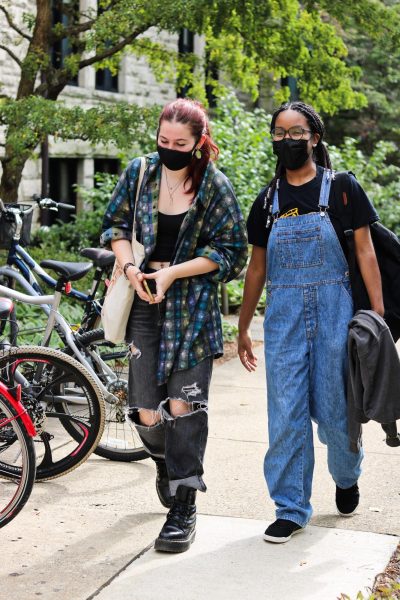Ethnic Cleansing Threatens Uighurs
In mid-November, The New York Times released a trove of leaked Chinese Communist Party files detailing a massive government crackdown in the northwestern Chinese state of Xinjiang. The leaked pages make a clear statement: China has systematically targeted, imprisoned, and mistreated members of the Uighur ethnic minority who have traditionally called Xinjiang home.
Several of the leaked documents detail a private speech by President Xi Jinping to party officials in which he argues that the Uighurs, a Muslim religious minority, are Islamic extremists whose dangerous ideologies must be vigorously suppressed. In the leaked pages, Jinping asserts that “the struggle against terrorism, infiltration and separatism” must use the “organs of dictatorship” and show “absolutely no mercy.”
News of China’s attempts to commit cultural genocide against the Uighurs first broke in 2017 when satellite imagery and on-the-ground reports showed the CCP detaining Uighur people in a network of “re-education camps” throughout Xinjiang province, which borders Central Asia. Since their inception, the party’s official stance has been that the camps teach employable skills and encourage Islamic extremists to renounce their beliefs.
Since then, the number of existing camps has grown into the hundreds and the number of detained Uighurs is estimated between one and three million. Horrific stories of sexual violence, torture, organ harvesting, and harsh conditions in detention centers have proliferated to international media sources. While the independent press has only been able to access the camps via sanitized, state-controlled visits, the point of the camps is clear: to forcibly “re-educate” Uighurs such that they cease to identify with Islam and identify instead with the CCP, which has a zero-tolerance policy for dissent and separatism. Inside the camps, Uighurs are reportedly required to learn Mandarin Chinese, repeat pledges of allegiance to China, and forswear Islam.
“[W]hat they want is to force us to assimilate, to identify with the country, such that, in the future, the idea of Uyghur will be in name only, but without its meaning,” said one Uighur who left Xinjiang in 2017 to the Human Rights Watch.
China’s recent crackdown follows decades of complex political and religious controversy over the status of the Xinjiang province, which has been claimed by China since the CCP rose to power in 1949. Xinjiang has long hosted a variety of separatist movements that have sought to remove the province from China entirely in order to seek independence.
In recent decades, some Uighurs have joined radical Islamist movements around the world as well. A variety of security incidents in the years preceded the current crackdown, including riots over ethnic migration policies in 2009 and a string of terrorist attacks throughout China in the early 2010s. These events prompted hard-lining in the CCP’s approach to security in Xinjiang.
As a result, the entire province has become an incredibly dense and complex security state, with mass surveillance extending into nearly every single aspect of personal and public life. Highly advanced technology monitors Uighur population on an individual level, including biometric databases, surveillance cameras, social media monitoring, and, according to a recent report, the placement of Communist Party officials in the homes of married women whose husbands are detained in re-education camps.
“1.1 million local government officials have been deployed to spend about a week every two months living in the home of an Uighur host family,” read a report by The Independent. “Social media images show the new ‘relatives’ attending Uighur weddings, funerals, and other occasions once considered intimate and private.”
China reportedly also uses a ‘point system’ to determine who must be sent to re-education camps and who can remain on the outside. Uighurs can gain points by showing allegiance to the Chinese state, and they can lose points by showing adherence to their Uighur and Muslim identity — reportedly including actions such as owning a Qur’an, contacting Uighur family members living abroad in countries which China considers ‘sensitive,’ such as Afghanistan and Syria, and even for having family members and acquaintances whom the CCP considers suspicious. Those whose points fall too low vanish into the ever-growing network of re-education camps across Xinjiang.
Finally, perhaps the most chilling aspect of the point system is that detained Uighurs’ points are affected by the actions of their family members on the outside. This encourages Uighurs who are still free to remain docile in order to help secure the release of their family members.
China’s ethnic cleansing and cultural genocide of the Uighur people is massive in scope and flagrant in its abuse of human rights, yet international responses have largely been muted. Most governments around the world fear that, were they to call out China on its actions, China would wield its considerable economic might to exact punishment upon its critics. As such, few governments have been willing to outwardly criticize the CCP thus paving the way for China to continue oppressing Uighurs with little to no political consequences.
Today, hope for the Uighurs appears quite dim. China is a one-party political system, and the country lacks enough of a political opposition to stop this cultural genocide campaign from within. The only force which could save the Uighurs now would be widespread international condemnation. Naming and shaming the Chinese Communist Party for its actions, sanctioning Chinese state officials, and enforcing economic sanctions against Chinese businesses involved in the detention of Uighurs would pressure China to slow down or halt the crackdown.
However, given China’s growing grip on the global economy, the world seems unwilling thus far to stand up for Uighurs’ rights. If the international community doesn’t act soon, the Uighurs may very well cease to exist altogether.




